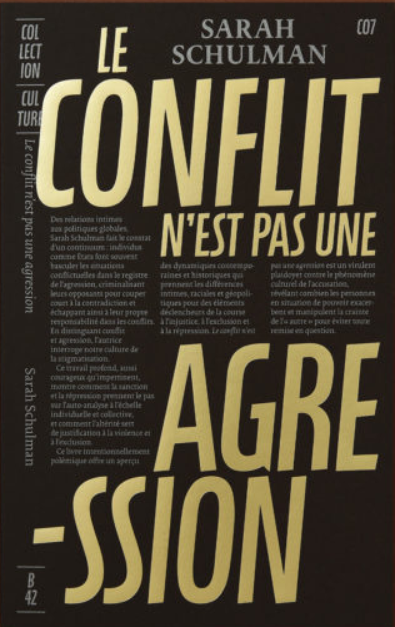What do you think?
Rate this book


248 pages, Paperback
First published October 4, 2016
We need to differentiate conflict from abuse. Conflict is a situation that generates discomfort, anxiety, anger or fear. Abuse is a situation where one's body or being is under threat.
Too often we conflate conflict with abuse. This is bad, because once the other is marked as an abuser, they are often cut off from their social circles, harassed, arrested or, at extremes, killed. Our culture of believing victims of abuse, without hearing the other side, is, in the long term, damaging to both the accused (who are cast out) and the victim (who are never made to reflect on their own potential culpability).
The issue with traumatised people is that they traumatise others. That which was abusive in their youth has instilled, in them, a hypervigilance that marks their present circumstances with past affects. They may unwittingly conflate their partner entering into a conflict with them, as their partner abusing them. In other words, their partner may trigger in them their memories of their abusive father, and they, subsequently, act out on these memories rather than in the present conflict at hand.
This is why we need to hold our abused friends accountable, so that they may heal and open up, rather than lash out and close off.
omfg i thought this was going to be about trauma politics, about how when people are traumatised they become increasingly fixated with purity — political, gendered, racialised — tankies, terfs, fascists, whatever.
but it's just about poor wee sarah whose text was never returned — owie zowie, aren't u the victim? that person over there who doesn't want to deal with you? they're the true abuser!
eugh, whatever.
like, trauma politics is a thing. i've been on both ends of it — persecutor and persecuted.
i've lashed out at my friends, especially when they were getting into jordan peterson. i closed myself off to them instead of talking about my anxieties and fears. it took the christchurch mosque terror attack for them to realise i wasn't just freaking out. but at the same time — i was freaking out — and i could have dealt with that better. i'd been sexually assaulted the year before and had only begun working through my own internalised racism from growing up in a settler state.
on the other hand, when i was trying to help my femme friend last yr, who'd been sexually assaulted by their boyfriend, they started projecting a lot of his traits onto me. it was awful. anything slightly masculine became problematic. i tried to ignore it — because i knew it was them getting triggered and triggers are fucking real. but the amount of gender dysphoria from being constantly called masculine by someone assigned-female-at-birth was disgusting. 2nd wave rad femme bullshit. i cut my ties and i'm glad. i hope they got the help they needed elsewhere.
i wish this book was about that — that messy awful place where love, care, trauma, terror and politics collide. where social critique and self-reflection go hand in hand and everyone benefits. i think this is what sarah wants — but her first example is so petty it reads like a self-absorbed teenage blog.
i agree, we need to transform fragility into resilience and ptsd into love. i disagree that calling the fragile delusional, infantile and shallow is the way to it.
'unblock mee owo is ur bestiee saraaa~'
Don't people have some responsibility to be accountable? Or does the new victimology require me to interpret yes as no, and silence as "I changed my mind"? No answer is not an answer. It is unreasonable to expect other people to interpret our silences. ... we could have talked through the anxiety. You know, helped each other. But there was no answer....
Why not have a common value of resolution? Let's imagine that this person did become accountable and in the end chose mutual kindness/accountability over accusation. She realized that she was mad at me for no reason caused by me, that this was old stuff acting itself out in new places, and so she did the right thing and picked up the phone. WE talked. We saw each other and the friendship was allowed to become important.
In another example from other people's lives, sometimes angry, supremacist, or traumatized people send emails commanding, "Do not contact me." I want to state here, for the record, that no one is obligated to obey a unidirectional order than has not been discussed. Negotiation is a human responsibility.
One problem here is how to intervene with a person who is overstating harm, hiding behind technology, shunning or otherwise escalating. In some cultures we are trained not to assist directly, saying we are "non-confrontational," that indifference is polite. Instead, we can learn to be accountable, to ask, "How can I help you and X to sit down and talk?"... The next step is to come as a group. "Hey, now there are five of us here together, with you. We can to help you an X sit down and talk. We find what you're doing to be very disturbing. We won't shun you, we won't punish you, but we also won't be co-opted into silence. How can we find an alternative?"
Refusing to be shunned for unjust, nonexistent, or absurd reasons is not "stalking.
The idea that people do things for reasons, and that these reasons are worth trying to understand, can be a normative assumption. It certainly is mine. That this understanding process is productive and generous becomes implied.
If someone wishes to alter a relationship, they must discuss it with the other person, negotiate the change, and listen to the other person's account. There is no ethical way around it.